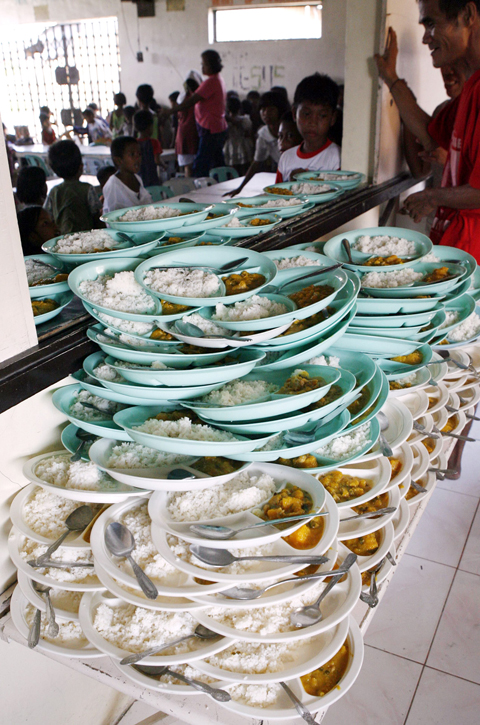Large pockets of extreme poverty and hunger persist in Asia, where the global downturn makes it more difficult to achieve UN goals to reduce the ranks of the poor, the Asian Development Bank (ADB) said yesterday.
Supporting smaller businesses, where most Asians are employed, is key to fueling domestic demand and growth, the Manila-based lender said in a report on key economic indicators.
In 19 Asian economies, including the most populous China and India, more than 10 percent of people live on less than US$1.25 a day and more than 10 percent are malnourished. This is despite the region’s success over the last 15 years in cutting the number of poor from one in two to around one in four, the report said.

PHOTO: REUTERS
Nepal is the worst off, with 55.1 percent of its population surviving on less than US$1.25 a day. In China and India, 15.9 percent and 41.6 percent of the population live below the poverty line respectively.
Income gap remains wide in many other countries.
More than 30 percent of Tajikistan’s population suffers from hunger, as do 20 percent to 30 percent of the people in Armenia, Bangladesh, Cambodia, Mongolia, India, Pakistan, Sri Lanka and East Timor, the ADB said.
Among the so-called UN Millennium Development Goals is cutting in half extreme poverty and hunger by 2015 and reducing maternal mortality by three-quarters over the same period.
The report said that Asia faces serious challenges in meeting goals linked to sanitation and maternal deaths, which remain unacceptably high in countries such as Afghanistan, Nepal and Laos.
About 1,800 out of every 100,000 Afghan women die in childbirth, while more than a quarter of urban households in 13 countries still lack access to improved sanitation, the bank said.
For Asia to cope with the global downturn, it needs to strengthen domestic demand to sustain growth, chief ADB economist Lee Jong-wha said.
Global demand for Asian exports was expected to remain sluggish, but the region could see a V-shaped recovery in 2010, he said.
Governments should focus not only on fiscal stimulus and large enterprises but on supporting small and medium-sized enterprises — where most Asian workers are employed — to build a substantial urban middle class with spending power, he said.
“It’s unlikely that Asia can export its way out of this slump, as they did after the 1997-98 Asian financial crisis,” Lee said. “This crisis clearly shows that Asia cannot rely only on external demand but must diversify its sources of growth and revive its domestic industries.”
Lee said the ADB would revise its growth forecast for Asia next month.
In March, the bank predicted a 3 percent growth rate this year for emerging East Asian economies and 6 percent growth next year, which is still below the 9.7 percent expansion in 2007.

OPTIMISTIC: A Philippine Air Force spokeswoman said the military believed the crew were safe and were hopeful that they and the jet would be recovered A Philippine Air Force FA-50 jet and its two-person crew are missing after flying in support of ground forces fighting communist rebels in the southern Mindanao region, a military official said yesterday. Philippine Air Force spokeswoman Colonel Consuelo Castillo said the jet was flying “over land” on the way to its target area when it went missing during a “tactical night operation in support of our ground troops.” While she declined to provide mission specifics, Philippine Army spokesman Colonel Louie Dema-ala confirmed that the missing FA-50 was part of a squadron sent “to provide air support” to troops fighting communist rebels in

ANGER: A video shared online showed residents in a neighborhood confronting the national security minister, attempting to drag her toward floodwaters Argentina’s port city of Bahia Blanca has been “destroyed” after being pummeled by a year’s worth of rain in a matter of hours, killing 13 and driving hundreds from their homes, authorities said on Saturday. Two young girls — reportedly aged four and one — were missing after possibly being swept away by floodwaters in the wake of Friday’s storm. The deluge left hospital rooms underwater, turned neighborhoods into islands and cut electricity to swaths of the city. Argentine Minister of National Security Patricia Bullrich said Bahia Blanca was “destroyed.” The death toll rose to 13 on Saturday, up from 10 on Friday, authorities

Two daughters of an Argentine mountaineer who died on an icy peak 40 years ago have retrieved his backpack from the spot — finding camera film inside that allowed them a glimpse of some of his final experiences. Guillermo Vieiro was 44 when he died in 1985 — as did his climbing partner — while descending Argentina’s Tupungato lava dome, one of the highest peaks in the Americas. Last year, his backpack was spotted on a slope by mountaineer Gabriela Cavallaro, who examined it and contacted Vieiro’s daughters Guadalupe, 40, and Azul, 44. Last month, the three set out with four other guides

ECONOMIC DISTORTION? The US commerce secretary’s remarks echoed Elon Musk’s arguments that spending by the government does not create value for the economy US Secretary of Commerce Howard Lutnick on Sunday said that government spending could be separated from GDP reports, in response to questions about whether the spending cuts pushed by Elon Musk’s Department of Government Efficiency could possibly cause an economic downturn. “You know that governments historically have messed with GDP,” Lutnick said on Fox News Channel’s Sunday Morning Futures. “They count government spending as part of GDP. So I’m going to separate those two and make it transparent.” Doing so could potentially complicate or distort a fundamental measure of the US economy’s health. Government spending is traditionally included in the GDP because